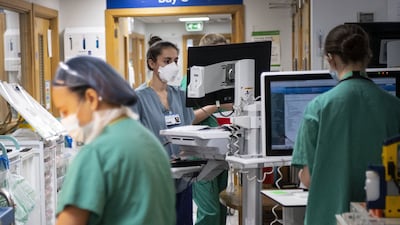A major new comparison of global health systems places the UK second to bottom in results including life expectancy and survival rates from cancer, strokes and heart attacks.
The first International Health Care Outcomes Index by the Civitas think tank is an independent evaluation that ranks the UK health system against 18 other comparable countries by looking at spending and 16 major healthcare outcomes.
Data for the comparison between countries has been taken from the Organisation for Economic Co-operation and Development heath statistics database.
All of the other countries studied, apart from America, provide universal access to health care and deliver better outcomes for patients.
Of the 16 major healthcare outcomes, the UK comes bottom four times — more than any other country — and is in the bottom three for eight of them.
No other comparable country has such a poor record.
The index ranks the UK 10th of 19 for spending on its health system as a percentage of GDP.
In 2019, the UK ranked 17th of 19 countries for life expectancy. For strokes and heart attacks, the UK has the worst survival rates.
Across five different types of cancer measured by the OECD, the NHS comes 16th of 18 countries.
For treatable diseases the UK is second to bottom — 15th of 16. If the UK matched the average of other countries, more than 6,500 lives every year would be saved, or 17 a day.
The only thing the UK tops the charts for is helping diabetics to avoid limb amputation.
“If what matters most to patients is the outcome of the treatment that they will receive, then these findings should be of concern to all, not least as the least well-off are those who have no alternative to the NHS, “ said Tim Knox, the report’s author.
“Aneurin Bevan once declared, shortly after the foundation of the NHS in 1948, that the NHS 'would make Great Britain the envy of all other nations in the world'.
"And Bevan was right — at the time. We then had one of the very few free at the point of use, universal health systems anywhere in the world.
"The problem is that many other countries have now overtaken us. By far. The latest British Social Attitudes survey suggests that the British public is beginning to realise this.
"While they recognise that the doctors, nurses, porters and medical staff do an amazing job, people are starting to ask serious questions about how good our health system really is.
“It is time politicians caught up. Britain is firmly at the bottom of the league. Across 19 comparable countries only America does worse. How can we be proud of that?”
Coffee: black death or elixir of life?
It is among the greatest health debates of our time; splashed across newspapers with contradicting headlines - is coffee good for you or not?
Depending on what you read, it is either a cancer-causing, sleep-depriving, stomach ulcer-inducing black death or the secret to long life, cutting the chance of stroke, diabetes and cancer.
The latest research - a study of 8,412 people across the UK who each underwent an MRI heart scan - is intended to put to bed (caffeine allowing) conflicting reports of the pros and cons of consumption.
The study, funded by the British Heart Foundation, contradicted previous findings that it stiffens arteries, putting pressure on the heart and increasing the likelihood of a heart attack or stroke, leading to warnings to cut down.
Numerous studies have recognised the benefits of coffee in cutting oral and esophageal cancer, the risk of a stroke and cirrhosis of the liver.
The benefits are often linked to biologically active compounds including caffeine, flavonoids, lignans, and other polyphenols, which benefit the body. These and othetr coffee compounds regulate genes involved in DNA repair, have anti-inflammatory properties and are associated with lower risk of insulin resistance, which is linked to type-2 diabetes.
But as doctors warn, too much of anything is inadvisable. The British Heart Foundation found the heaviest coffee drinkers in the study were most likely to be men who smoked and drank alcohol regularly.
Excessive amounts of coffee also unsettle the stomach causing or contributing to stomach ulcers. It also stains the teeth over time, hampers absorption of minerals and vitamins like zinc and iron.
It also raises blood pressure, which is largely problematic for people with existing conditions.
So the heaviest drinkers of the black stuff - some in the study had up to 25 cups per day - may want to rein it in.
Rory Reynolds
UAE currency: the story behind the money in your pockets
Ferrari 12Cilindri specs
Engine: naturally aspirated 6.5-liter V12
Power: 819hp
Torque: 678Nm at 7,250rpm
Price: From Dh1,700,000
Available: Now
COMPANY%20PROFILE
%3Cp%3E%3Cstrong%3EName%3A%3C%2Fstrong%3E%20PlanRadar%3Cbr%3E%3Cstrong%3EStarted%3A%20%3C%2Fstrong%3E2013%3Cbr%3E%3Cstrong%3ECo-founders%3A%20%3C%2Fstrong%3EIbrahim%20Imam%2C%20Sander%20van%20de%20Rijdt%2C%20Constantin%20K%C3%B6ck%2C%20Clemens%20Hammerl%2C%20Domagoj%20Dolinsek%3Cbr%3E%3Cstrong%3EBased%3A%20%3C%2Fstrong%3EVienna%2C%20Austria%3Cbr%3E%3Cstrong%3ESector%3A%20%3C%2Fstrong%3EConstruction%20and%20real%20estate%3Cbr%3E%3Cstrong%3ECurrent%20number%20of%20staff%3A%20%3C%2Fstrong%3E400%2B%3Cbr%3E%3Cstrong%3EInvestment%20stage%3A%20%3C%2Fstrong%3ESeries%20B%3Cbr%3E%3Cstrong%3EInvestors%3A%3C%2Fstrong%3E%20Headline%2C%20Berliner%20Volksbank%20Ventures%2C%20aws%20Gr%C3%BCnderfonds%2C%20Cavalry%20Ventures%2C%20Proptech1%2C%20Russmedia%2C%20GR%20Capital%3C%2Fp%3E%0A
UAE currency: the story behind the money in your pockets






